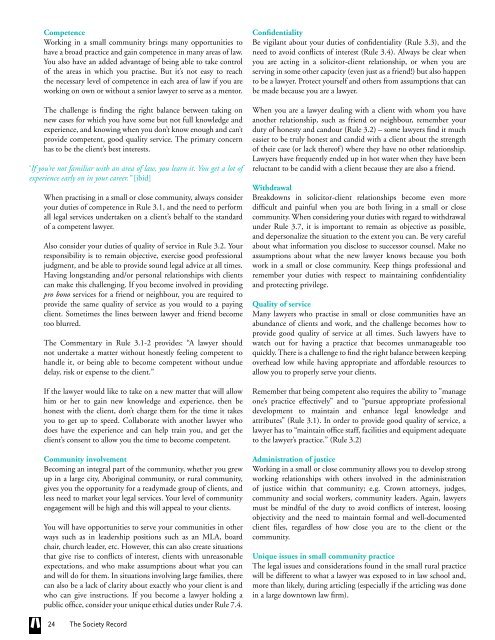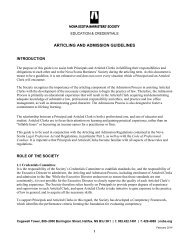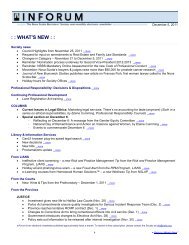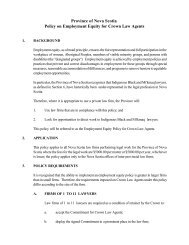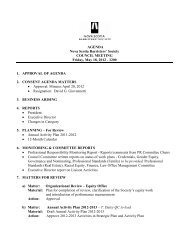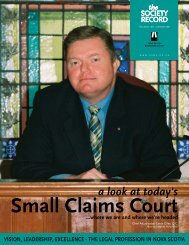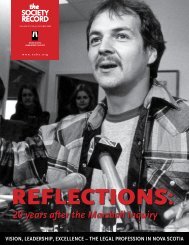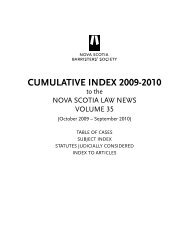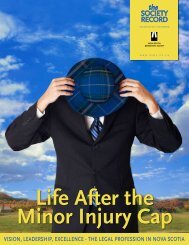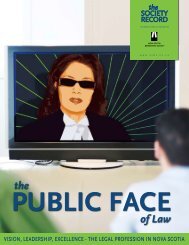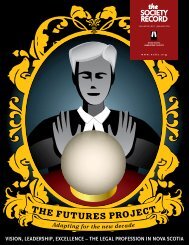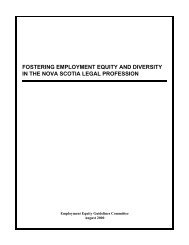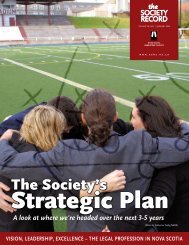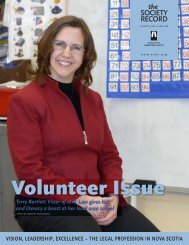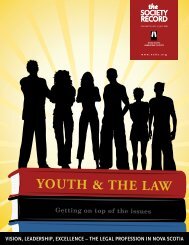the SOCIETY RECORD - Nova Scotia Barristers' Society
the SOCIETY RECORD - Nova Scotia Barristers' Society
the SOCIETY RECORD - Nova Scotia Barristers' Society
Create successful ePaper yourself
Turn your PDF publications into a flip-book with our unique Google optimized e-Paper software.
Competence<br />
Working in a small community brings many opportunities to<br />
have a broad practice and gain competence in many areas of law.<br />
You also have an added advantage of being able to take control<br />
of <strong>the</strong> areas in which you practise. But it’s not easy to reach<br />
<strong>the</strong> necessary level of competence in each area of law if you are<br />
working on own or without a senior lawyer to serve as a mentor.<br />
The challenge is finding <strong>the</strong> right balance between taking on<br />
new cases for which you have some but not full knowledge and<br />
experience, and knowing when you don’t know enough and can’t<br />
provide competent, good quality service. The primary concern<br />
has to be <strong>the</strong> client’s best interests.<br />
‘If you’re not familiar with an area of law, you learn it. You get a lot of<br />
experience early on in your career.” [ibid]<br />
When practising in a small or close community, always consider<br />
your duties of competence in Rule 3.1, and <strong>the</strong> need to perform<br />
all legal services undertaken on a client’s behalf to <strong>the</strong> standard<br />
of a competent lawyer.<br />
Also consider your duties of quality of service in Rule 3.2. Your<br />
responsibility is to remain objective, exercise good professional<br />
judgment, and be able to provide sound legal advice at all times.<br />
Having longstanding and/or personal relationships with clients<br />
can make this challenging. If you become involved in providing<br />
pro bono services for a friend or neighbour, you are required to<br />
provide <strong>the</strong> same quality of service as you would to a paying<br />
client. Sometimes <strong>the</strong> lines between lawyer and friend become<br />
too blurred.<br />
The Commentary in Rule 3.1-2 provides: “A lawyer should<br />
not undertake a matter without honestly feeling competent to<br />
handle it, or being able to become competent without undue<br />
delay, risk or expense to <strong>the</strong> client.”<br />
If <strong>the</strong> lawyer would like to take on a new matter that will allow<br />
him or her to gain new knowledge and experience, <strong>the</strong>n be<br />
honest with <strong>the</strong> client, don’t charge <strong>the</strong>m for <strong>the</strong> time it takes<br />
you to get up to speed. Collaborate with ano<strong>the</strong>r lawyer who<br />
does have <strong>the</strong> experience and can help train you, and get <strong>the</strong><br />
client’s consent to allow you <strong>the</strong> time to become competent.<br />
Community involvement<br />
Becoming an integral part of <strong>the</strong> community, whe<strong>the</strong>r you grew<br />
up in a large city, Aboriginal community, or rural community,<br />
gives you <strong>the</strong> opportunity for a readymade group of clients, and<br />
less need to market your legal services. Your level of community<br />
engagement will be high and this will appeal to your clients.<br />
You will have opportunities to serve your communities in o<strong>the</strong>r<br />
ways such as in leadership positions such as an MLA, board<br />
chair, church leader, etc. However, this can also create situations<br />
that give rise to conflicts of interest, clients with unreasonable<br />
expectations, and who make assumptions about what you can<br />
and will do for <strong>the</strong>m. In situations involving large families, <strong>the</strong>re<br />
can also be a lack of clarity about exactly who your client is and<br />
who can give instructions. If you become a lawyer holding a<br />
public office, consider your unique ethical duties under Rule 7.4.<br />
Confidentiality<br />
Be vigilant about your duties of confidentiality (Rule 3.3), and <strong>the</strong><br />
need to avoid conflicts of interest (Rule 3.4). Always be clear when<br />
you are acting in a solicitor-client relationship, or when you are<br />
serving in some o<strong>the</strong>r capacity (even just as a friend!) but also happen<br />
to be a lawyer. Protect yourself and o<strong>the</strong>rs from assumptions that can<br />
be made because you are a lawyer.<br />
When you are a lawyer dealing with a client with whom you have<br />
ano<strong>the</strong>r relationship, such as friend or neighbour, remember your<br />
duty of honesty and candour (Rule 3.2) – some lawyers find it much<br />
easier to be truly honest and candid with a client about <strong>the</strong> strength<br />
of <strong>the</strong>ir case (or lack <strong>the</strong>reof) where <strong>the</strong>y have no o<strong>the</strong>r relationship.<br />
Lawyers have frequently ended up in hot water when <strong>the</strong>y have been<br />
reluctant to be candid with a client because <strong>the</strong>y are also a friend.<br />
Withdrawal<br />
Breakdowns in solicitor-client relationships become even more<br />
difficult and painful when you are both living in a small or close<br />
community. When considering your duties with regard to withdrawal<br />
under Rule 3.7, it is important to remain as objective as possible,<br />
and depersonalize <strong>the</strong> situation to <strong>the</strong> extent you can. Be very careful<br />
about what information you disclose to successor counsel. Make no<br />
assumptions about what <strong>the</strong> new lawyer knows because you both<br />
work in a small or close community. Keep things professional and<br />
remember your duties with respect to maintaining confidentiality<br />
and protecting privilege.<br />
Quality of service<br />
Many lawyers who practise in small or close communities have an<br />
abundance of clients and work, and <strong>the</strong> challenge becomes how to<br />
provide good quality of service at all times. Such lawyers have to<br />
watch out for having a practice that becomes unmanageable too<br />
quickly. There is a challenge to find <strong>the</strong> right balance between keeping<br />
overhead low while having appropriate and affordable resources to<br />
allow you to properly serve your clients.<br />
Remember that being competent also requires <strong>the</strong> ability to ”manage<br />
one’s practice effectively” and to “pursue appropriate professional<br />
development to maintain and enhance legal knowledge and<br />
attributes” (Rule 3.1). In order to provide good quality of service, a<br />
lawyer has to “maintain office staff, facilities and equipment adequate<br />
to <strong>the</strong> lawyer’s practice.” (Rule 3.2)<br />
Administration of justice<br />
Working in a small or close community allows you to develop strong<br />
working relationships with o<strong>the</strong>rs involved in <strong>the</strong> administration<br />
of justice within that community; e.g. Crown attorneys, judges,<br />
community and social workers, community leaders. Again, lawyers<br />
must be mindful of <strong>the</strong> duty to avoid conflicts of interest, loosing<br />
objectivity and <strong>the</strong> need to maintain formal and well-documented<br />
client files, regardless of how close you are to <strong>the</strong> client or <strong>the</strong><br />
community.<br />
Unique issues in small community practice<br />
The legal issues and considerations found in <strong>the</strong> small rural practice<br />
will be different to what a lawyer was exposed to in law school and,<br />
more than likely, during articling (especially if <strong>the</strong> articling was done<br />
in a large downtown law firm).<br />
24<br />
The <strong>Society</strong> Record


